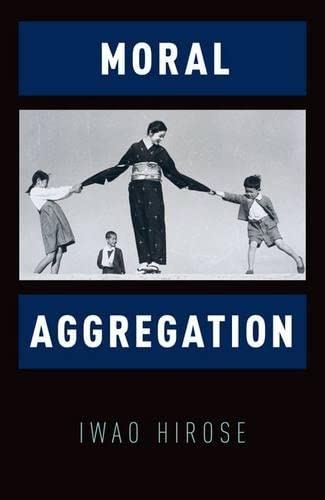All books / Book
Moral Aggregation

| Full title: | Moral Aggregation |
|---|---|
| ISBN: | 9780199933686 |
| ISBN 10: | 0199933685 |
| Authors: | Hirose, Iwao |
| Publisher: | Oxford University Press |
| Edition: | 1 |
| Num. pages: | 248 |
| Binding: | Hardcover |
| Language: | en |
| Published on: | 2014 |
Read the reviews and/or buy it on Amazon.com
Synopsis
Aggregation Is One Of The Fundamental Features Of Utilitarianism And Other Forms Of Axiological Theories, Permitting The Trade-off Of Morally Relevant Factors Between Different Individuals. It Is Also A Feature That Critics Of Utilitarianism Condemn. Yet The Basic Features Of Aggregation Are Not Understood Properly. This Book Elucidates The Theoretical Structure And Scope Of Interpersonal And Intra-personal Aggregation In Ethics And Defends A Form Of Aggregation, Formal Aggregation, As Distinguished From Substantive Aggregation Of Utilitarianism. Part 1 A Theory Of Aggregation -- 1 Why Aggregation? 3 -- 1.1 Aggregation In Ethics 3 -- 1.2 Example I: Qaly Aggregation 8 -- 1.3 Example Ii: Taurek's Rescue Case 11 -- 1.4 The Structure Of This Book 14 -- 2 The Structure Of Aggregation 19 -- 2.1 Aggregation Defined 19 -- 2.2 What Is Aggregative And What Is Not? 25 -- 2.3 The Structure Of Interpersonal Aggregation 31 -- 2.3.1 Interpersonal Comparability 32 -- 2.3.2 Impartiality 36 -- 2.3.3 Pareto 38 -- 2.3.4 Continuity 39 -- 3 Formal And Substantive Aggregation 42 -- 3.1 Counterexample To Interpersonal Aggregation: The World Cup Case 42 -- 3.2 Hidden Assumptions 46 -- 3.3 Substantive And Formal Aggregation 51 -- 3.4 Formal Aggregation In Perspective 59 -- 4 Aggregation And The Separateness Of Persons 64 -- 4.1 The Separateness Of Persons: Rawls's Strict Account 64 -- 4.2 The Wider Account 67 -- 4.3 Defusing The Wider Account 73 -- 4.4 The Separateness Objection And Contractarianism 78 -- 4.5 Scanlon's Contractualism 84 -- 5 Intra-personal Aggregation 89 -- 5.1 Who Supports Intra-personal Aggregation? 89 -- 5.2 The Structure Of Intra-personal Aggregation 92 -- 5.3 The Objection To Intra-personal Continuity 96 -- 5.4 The Objection To Temporal Symmetry 98 -- Part 2 The Number Problem -- 6 Taurek's Argument For The Coin-toss 109 -- 6.1 Taurek And The Rescue Case 109 -- 6.2 Taurek (1): The Permissibility Claim 112 -- 6.3 Taurek (2): The No-worse Claim 115 -- 6.4 Taurek (3): The Equal Respect Claim 119 -- 6.5 Two Remarks On Taurek's Argument 122 -- 6.6 Critics Of Aggregation (l): Nozick 125 -- 6.7 Critics Of Aggregation (2): Rawls 128 -- 6.8 Critics Of Aggregation (3): Nagel 131 -- 6.9 Three Solutions And Many Intuitions 135 -- 7 Four Responses 140 -- 7.1 How To Deal With Taurek's Claim? 140 -- 7.2 Kavka On Taurek 142 -- 7.3 The Kamm-scanlon Argument 147 -- 7.4 Kamm's Argument For Best Outcomes 161 -- 7.5 Schelling's Probabilistic Argument 168 -- 8 Irrelevant Utilities And Formal Aggregation 177 -- 8.1 The Principle Of Irrelevant Utilities 177 -- 8.2 The Objection To The Principle Of Irrelevant Utilities 184 -- 8.3 Taking Unfairness Seriously 188 -- 8.4 The Large-scale Rescue Case Revisited 197 -- 8.5 The Force Of Aggregation 200 -- 9 Weighted Lotteries 203 -- 9.1 The Third Proposal: Weighted Lotteries 203 -- 9.2 The Appeal Of Weighted Lotteries 205 -- 9.3 The Procedure Of Proportional Chances: Two Criticisms 210 -- 9.4 The General Weighted Lotteries: Two-step Criticism 214 -- 9.5 An Additional Problem 218. Iwao Hirose. Includes Bibliographical References And Index. Includes Bibliographical References And Index.